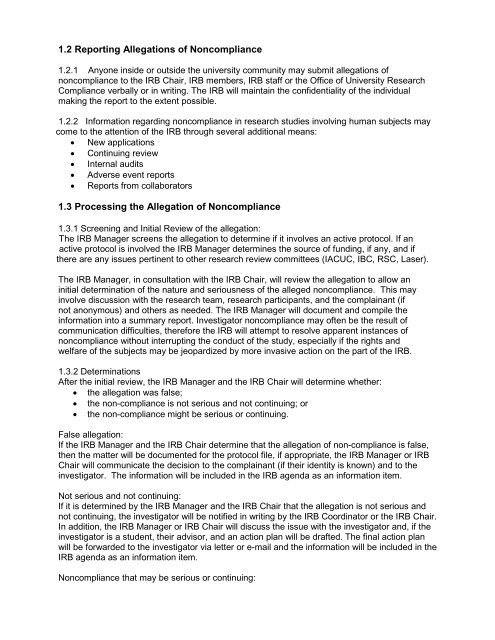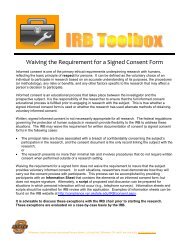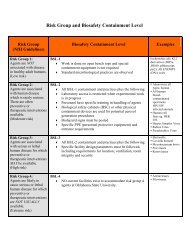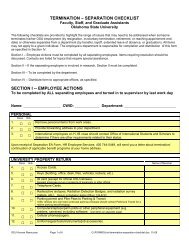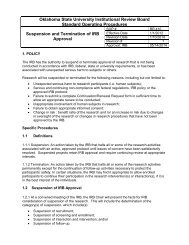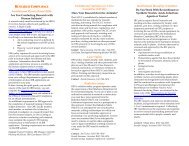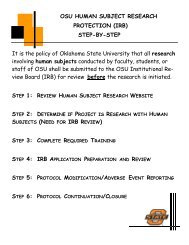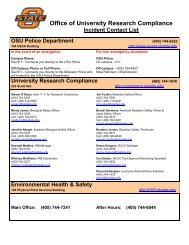Oklahoma State University Institutional Review Board
Oklahoma State University Institutional Review Board
Oklahoma State University Institutional Review Board
You also want an ePaper? Increase the reach of your titles
YUMPU automatically turns print PDFs into web optimized ePapers that Google loves.
1.2 Reporting Allegations of Noncompliance<br />
1.2.1 Anyone inside or outside the university community may submit allegations of<br />
noncompliance to the IRB Chair, IRB members, IRB staff or the Office of <strong>University</strong> Research<br />
Compliance verbally or in writing. The IRB will maintain the confidentiality of the individual<br />
making the report to the extent possible.<br />
1.2.2 Information regarding noncompliance in research studies involving human subjects may<br />
come to the attention of the IRB through several additional means:<br />
• New applications<br />
• Continuing review<br />
• Internal audits<br />
• Adverse event reports<br />
• Reports from collaborators<br />
1.3 Processing the Allegation of Noncompliance<br />
1.3.1 Screening and Initial <strong>Review</strong> of the allegation:<br />
The IRB Manager screens the allegation to determine if it involves an active protocol. If an<br />
active protocol is involved the IRB Manager determines the source of funding, if any, and if<br />
there are any issues pertinent to other research review committees (IACUC, IBC, RSC, Laser).<br />
The IRB Manager, in consultation with the IRB Chair, will review the allegation to allow an<br />
initial determination of the nature and seriousness of the alleged noncompliance. This may<br />
involve discussion with the research team, research participants, and the complainant (if<br />
not anonymous) and others as needed. The IRB Manager will document and compile the<br />
information into a summary report. Investigator noncompliance may often be the result of<br />
communication difficulties, therefore the IRB will attempt to resolve apparent instances of<br />
noncompliance without interrupting the conduct of the study, especially if the rights and<br />
welfare of the subjects may be jeopardized by more invasive action on the part of the IRB.<br />
1.3.2 Determinations<br />
After the initial review, the IRB Manager and the IRB Chair will determine whether:<br />
• the allegation was false;<br />
• the non-compliance is not serious and not continuing; or<br />
• the non-compliance might be serious or continuing.<br />
False allegation:<br />
If the IRB Manager and the IRB Chair determine that the allegation of non-compliance is false,<br />
then the matter will be documented for the protocol file, if appropriate, the IRB Manager or IRB<br />
Chair will communicate the decision to the complainant (if their identity is known) and to the<br />
investigator. The information will be included in the IRB agenda as an information item.<br />
Not serious and not continuing:<br />
If it is determined by the IRB Manager and the IRB Chair that the allegation is not serious and<br />
not continuing, the investigator will be notified in writing by the IRB Coordinator or the IRB Chair.<br />
In addition, the IRB Manager or IRB Chair will discuss the issue with the investigator and, if the<br />
investigator is a student, their advisor, and an action plan will be drafted. The final action plan<br />
will be forwarded to the investigator via letter or e-mail and the information will be included in the<br />
IRB agenda as an information item.<br />
Noncompliance that may be serious or continuing:


